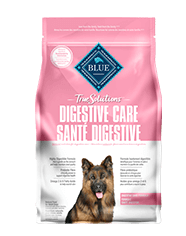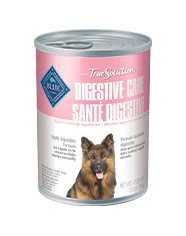What are the signs of a sensitive stomach?
Vomiting and diarrhea are obvious signs your dog has digestive problems. As unpleasant as those symptoms are, your dog’s body is working properly to rid itself of the offending element.
Less prominent signs of stomach issues may include:
- Abdominal bloating
- Lip-licking and repetitive swallowing
- Restlessness
- Frequent drooling
What can cause an upset stomach in dogs?
Your dog doesn’t have to raid the garbage to have stomach problems. Viruses, such as the parvovirus or intestinal parasites can upset your dog’s stomach when he’s exposed to another pet’s infected stools.
Common food poisoning bacteria like salmonella, E. coli and clostridia can cause vomiting and diarrhea in dogs, just as they do in humans. Intestinal bacteria imbalances, food sensitivity issues and even stress from separation anxiety can cause your dog to have a sensitive stomach.
What can I do to help my dog overcome digestive challenges?
-
Hydrate! Hydrate! Hydrate! Vomiting and diarrhea usually need to run their course before your dog will feel better, so it’s important to help your dog stay hydrated as he recovers. Give him ice chips, and if he keeps them down without vomiting, try a few tablespoons of water every few hours until his stomach settles.
-
Try Gentle Foods. Canned pumpkin is another favorite food for sensitive stomachs that helps fight indigestion in dogs because it is rich in fiber. Consult with your veterinarian for the appropriate amount to add to your pet's daily meals.
-
Find Supportive Dog Food. If your dog often has a sensitive stomach or GI tract, your veterinarian may recommend a diet featuring highly digestible ingredients with balanced fiber and supportive nutrients like omega 3 fatty acids.
Always ask your veterinarian to recommend the best approach for your dog’s specific gastrointestinal needs.
When should I call the vet about my dog’s sensitive stomach?
Contact your veterinarian immediately if your dog vomits several times within a short time frame, continues to vomit for more than 24 hours or has any of the following symptoms:
- Continued dry heaves without vomiting
- Bloated belly or painful tummy
- Constant vomiting with no breaks in between
- He’s a puppy or senior dog with other illnesses
- Blood or black coffee-like granules in his vomit or stool
- Dehydration: sunken eyes, sticky gums
- Signs of lethargy and disorientation
- Sleeps frequently or collapses
These symptoms can indicate a more chronic, serious problem like irritable bowel disorder, gastric bloat or pancreatitis, which require treatment from your veterinarian as soon as possible.
Take heart, it’s common for dogs to have sensitive stomachs. If addressed early, your dog’s digestive problems can be resolved successfully and he can get back to his normal routine.



